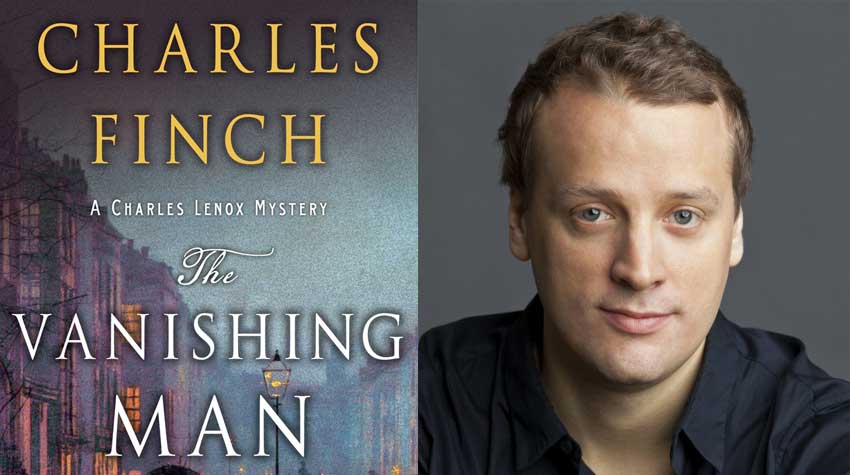Q&A with Charles Finch, Author of The Vanishing Man
By Crime HQ
February 19, 2019Enjoy this exclusive chat between author and editor!

Criminal Element is thrilled to welcome author Charles Finch and his longtime editor (and the host of Case Closed, our new podcast series!) Charles Spicer. The two recently sat down to discuss Finch’s newest Charles Lenox mystery The Vanishing Man, Shakespearean London, England’s class system, and the what-ifs of time travel.
***
Charles Spicer: Did writing a prequel bring out a side of Lenox you’ve never seen before?
Charles Finch: Oh yes, hugely and unexpectedly.
In the previous Lenox novels, from A Beautiful Blue Death all the way through The Inheritance ten books later, he’s established in his profession, fortunate in his friends, and happy in his social sphere.
I’m not sure I realized when I first contemplated writing a prequel what a shift it would force me to make on my own perspective of Lenox as a character to write about him at the age of 22 or 23, when he’s still young and hungry, and above all still uncertain about how things are going to turn out – whether he’s making the right decisions. He has no idea whether being a detective is a good idea. It’s just his passion. I remember older people telling me when I was that age that I could do anything I wanted, with wistful envy, and thinking, but that’s what you would like, I have no idea how any of this is going to turn out. It’s scarier than you remember!
Lenox’s life in the prequel is still very comfortable, but it’s less stable, and he has to confront serious doubts about who he is. He has to learn. He has to make mistakes. Writing about that version of Lenox made me realize how much about the character I had previously taken for granted. It was really exhilarating to go back and make new sense of him.
CS: You make the Victorian period so alive in your novels. Do you ever wish you can transport yourself back there? Is there another period you might want to travel back to?
CF: Well, I’m a hypochondriac, so I happen to know that the average adult in Victorian England would have gained immunity by the age of 5 to a huge array of diseases that would kill me within, say, three or four days.
But if I had a magic immunity granted to me for this experiment, I would, of course, love to go back more than anything. I’m just curious about what the streets felt like. Was it rougher or more civilized than now? Both? I probably couldn’t even have spoken to most of my characters without committing a grave social offense! I’d still try.
The other periods I would go back to are so numerous I can’t even rank them. Colonial America, wartime Paris, Edo Japan. But my first choice would be Shakespeare’s London. It would be so thrilling. And I could be such a good spy because we have maddening gaps of knowledge about his life and work. It’s partly why The Vanishing Man is about Shakespeare, that fascination with those mysteries! I try to answer a couple of them.
Read our review of The Vanishing Man!
CS: What does Lenox’s interaction with the Duke say about England’s class system at this time?
CF: It’s interesting: before I started writing historical fiction set in Victorian England I pictured three big blocs of citizens in the cities: the aristocrats, the business—or if you like—burgher class, and the lower classes. (That obviously excludes the countryside’s different delineations of rank, which had their own nuances.)
In fact, like everything about history, it was more complicated than I superficially understood it to be. To someone like Charles Lenox—well-bred, well-educated, well-connected—a figure like the Duke of Dorset (his client in The Vanishing Man) would have nonetheless been a figure of awesome consequence. I try to really emphasize the huge, huge gap between them socially, so that when Lenox stands up to the Duke, it matters—gives a hint of the steeliness and determination that will ultimately come to be so useful in his career as a detective.
See More: Charles Finch on his Charles Lenox Mystery Series
CS: What fresh plot opportunity did writing about Shakespeare give you in this novel?
CF: As the series has progressed, I’ve really enjoyed weaving different parts of England’s history into the 1860s and 1870s. It’s the kind of challenge a writer enjoys. For instance in An Old Betrayal, one of my favorites in the series, I had to learn and write a lot about the period when Jane Austen was alive, around the time of the Napoleonic Wars.
Writing about Shakespeare was like that experience on steroids—it gave me a chance to look into every old apocryphal story about him and his times, and in the end (without giving too much away) I ran with one of the most plausible unproven theories about his life, which is directly connected to the crime Lenox is solving in 1851…
CS: Anything new intriguing historical fact you learned about London while writing The Vanishing Man?
CF: Millions. But I will give one about Shakespeare, just to round out the last answer, my favorite detail: I learned that as tradition has it, Shakespeare’s first job in London was minding horses outside of the theaters. I love that. I love imagining him listening to the laughs and groans from inside the theater and feeling desperate to get inside himself. It didn’t take him very long. That’s one of the benefits of genius, you learn when you write about Shakespeare. It’s an extremely efficient career boost.
